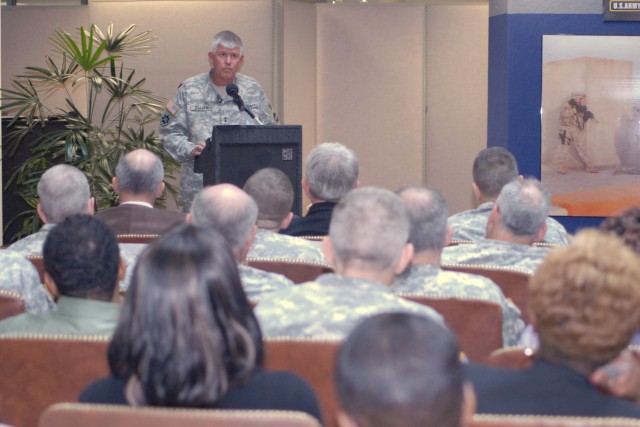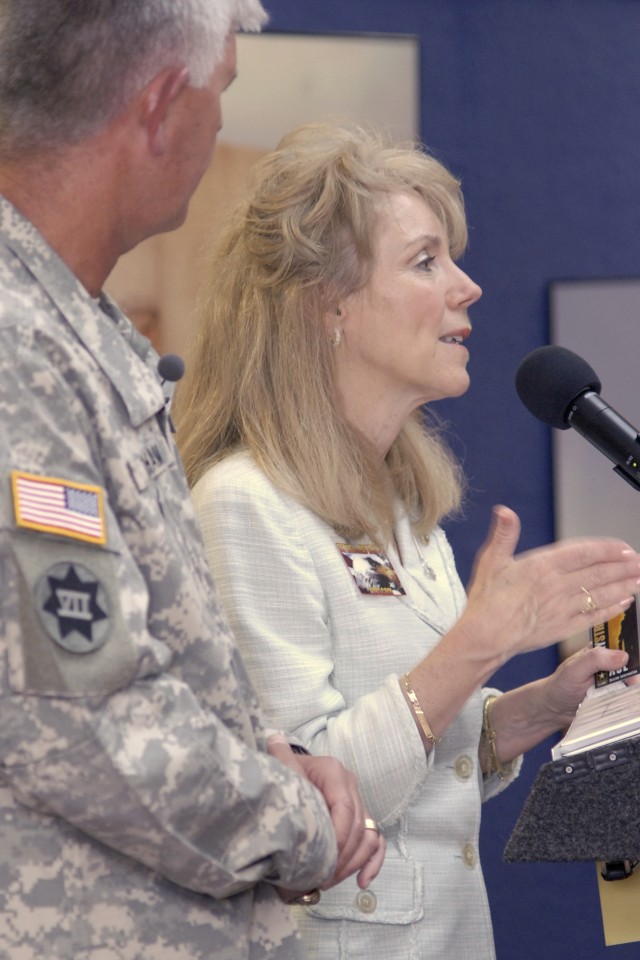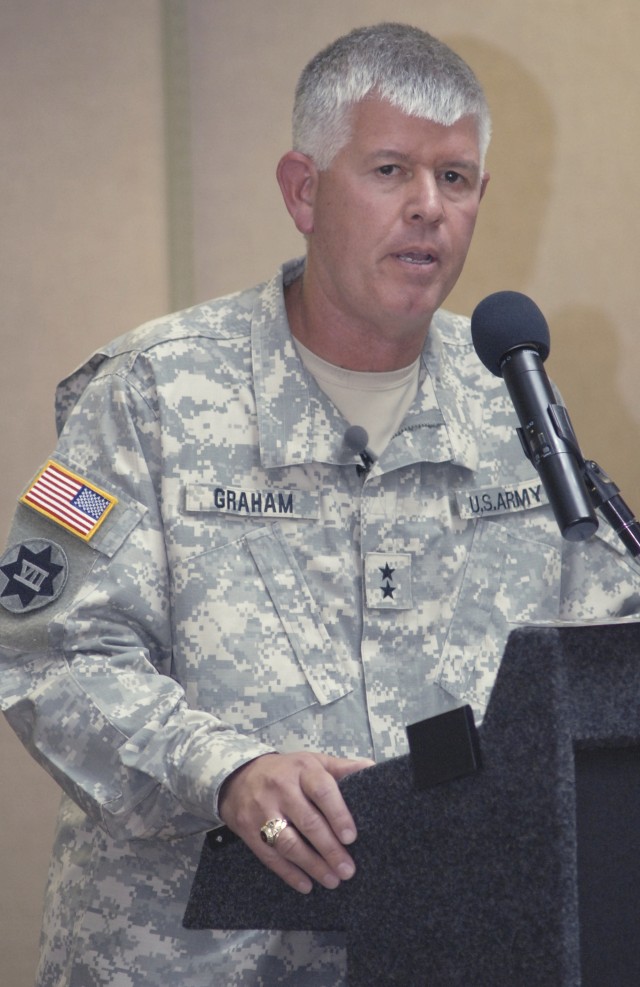FORT McPHERSON, Ga. (Sept. 30, 2009) -- "In suffering, we either find ourselves or we destroy ourselves," said Maj. Gen. Mark Graham, quoting from Oswald Chambers' devotional.
Army Forces Command's deputy chief of staff, G-3/5/7, told the story of his family's personal experience with suicide and tragedy, and how they now share their past to help others.
Graham and his wife Carol agreed to share their personal story as a closing to Army Suicide Prevention Month, having lost their son Kevin to suicide in June 2003. Seven months later, the Grahams lost their other son Jeffrey, who was killed by an improvised explosive device in Khaldiyah, Iraq.
During his introduction of Graham, Gil Gilleland, FORSCOM deputy director of personnel, said he is proud to call Graham a mentor and a friend.
"When Maj. Gen. Graham found out I had a personal history of a family member who committed suicide, he reached out to me and my sister," Gilleland said. "He knows you learn to accept it but you never forget. You never get over it."
Following a moment of silence to remember the Soldiers killed and wounded, Graham encouraged the audience of more than 300 to honestly acknowledge the effect suicide has on the Army and to raise awareness of untreated depression.
Need to beat stigma
"As an Army and as a nation, we must get in front of suicide," Graham said.
Graham emphasized that in the past, fear and ignorance created a stigma of suicide, one that has prevented recognition of the warning signs of depression. He added that just saying the word "suicide" invokes negative perceptions and judgment, and that these feelings need to change.
"Suicide - just hearing the word makes people cringe," Graham said. "It makes people want to leave the room or leave the conversation."
Graham continued by saying when people have these thoughts, they are hurting and they need to be helped, not judged.
"I'm here to tell you we cannot be quiet any longer," Graham said. "We cannot take that hushed tone when speaking of suicide and we cannot ignore the warning signs."
'Disney' family shattered
Reflecting on family history, Graham said he met his wife Carol after college and with their three children, Jeffrey, Melanie and Kevin, they traveled the globe on military assignments. Over the years, Graham said he has learned many lessons on life, leadership, management and success.
"The single most important lesson I've learned is that no one is isolated from hardship," Graham said.
Before the loss of their sons, Graham said they had a "Walt Disney family life," saying that all three children were students at the University of Kentucky and even shared an apartment.
Then, "with one phone call, our world as we knew it was gone," Graham said. "We would never be the same."
On June 21, 2003, they lost son Kevin to suicide. A top ROTC cadet, Kevin was studying to be an Army doctor. Graham said Kevin was a scholarship student battling depression who stopped taking his medication because he did not want the Army to know of his illness. At the time, Graham and wife Carol were overseas stationed in Korea.
"We blame ourselves for not recognizing the warning signs, for not realizing that Kevin's depression was a true medical illness -- not just a sad feeling," Graham said.
Graham and his wife realized that in order to keep living, they had to find a way to channel their grief. They focused on raising awareness of untreated depression and setting up suicide-prevention programs on college campuses.
"We somehow knew that something good had to come from Kevin's death," Graham said.
Graham said their daughter Melanie tried to continue with her studies and son Jeffrey, a recent engineering graduate, prepared for an upcoming Army deployment.
On Feb. 19, 2004, Graham recalls getting ready for work when wife Carol read on the Internet that two Soldiers were killed near Fallujah, Iraq.
"Never in a million years do you ever believe it could be your son," Graham said. "Not again - it could not be true."
Remembering the devastating realization that the family had lost one son, Graham said the fact they had now lost both sons was beyond comprehension.
Graham said his family was grieving so deeply, they did not believe they could continue serving the Army. Graham was convinced it was time to retire. Sitting down for morning coffee, Carol read a morning devotional and looking at her, Graham realized she had tears flowing down her face.
"I will never forget the way she choked back her words as she began to read to me the devotional from March 11," Graham said.
The devotional seemed directed at the Grahams, describing their exact feelings of emptiness and loss, encouraging them to continue on and use their grief to help others. The Grahams realized they were meant to continue serving Soldiers and families.
One day at a time
After six years, Graham said he sometimes wakes up wondering if it was all a horrible dream. Now, he said, they live one day at a time. Needless to say, it has been difficult for the family, watching the welcome home ceremonies of Soldiers and celebrating the marriages, birthdays and graduations of friends.
"It left us always wondering how the world could even turn without our boys in it," Graham said.
Graham said they faithfully attended church, holding back their tears as others' prayers were seemingly answered. Outside, the world did continue turning, as other Soldiers were killed in action, while others were killed by suicide.
"It occurred to us that maybe this was the reason we were meant to continue to serve," said Graham.
Trying to comfort those people, Graham said an amazing phenomenon occurred: they received more healing and help than they gave. Gradually, he said, they began to smile and laugh again.
"The more we talked about Jeffrey and Kevin and shared stories with each other, the more we realized they really weren't gone at all," said Graham. "They are so much a part of us."
Graham recalled a very personal moment at his promotion ceremony. The general promoting him had each of the boys' names engraved on the stars.
"As he pinned the stars on me, he said, 'Your boys will always be with you,'" Graham said. "As a general officer, I now wear the stars on my uniform and I symbolically know that both of my boys are wherever I go."
Graham said there will always be a hole and a void in his heart but sees this as strength.
"Everything we do is in memory of our sons," said Graham.
Dedicating their lives
Pledging to use Kevin's death as a way to raise awareness about untreated depression, post-traumatic stress disorder and suicide, Graham said he and his wife are compelled to speak out on behalf of all those suffering from these illnesses.
"We've got to encourage people to seek the assistance they need without the fear of embarrassment or retribution," said Graham. "We must do this to save lives."
Reflecting on the training of Soldiers and their families, Graham said his family has realized they need to take their training to another level, a level of support and reinforcing strong values. Removing the terrible stigma of suicide is a top priority and Graham stressed that seeking help is a sign of strength, not weakness.
During his previous assignment at Fort Carson, Colo., Graham attended a senior leadership conference. At the conference, he explained that today's all-volunteer Army is different from the Army of the past and there needs to be a new school of thought in the way Soldiers are cared for and treated.
Nearing the end of his talk at Forces Command's G-1 atrium with full-capacity attendees even listening from the balconies, Graham enlisted the help of all present to empower the Army and civilian communities with the education needed to break through the stigma surrounding suicide. Graham asked that everyone remain vigilant in suicide prevention and become knowledgeable of the warning signs of depression.
"It has been said that depression is the slow bleeding of the soul," said Graham. "Be the tourniquet that stops the bleeding of these priceless souls."






Social Sharing